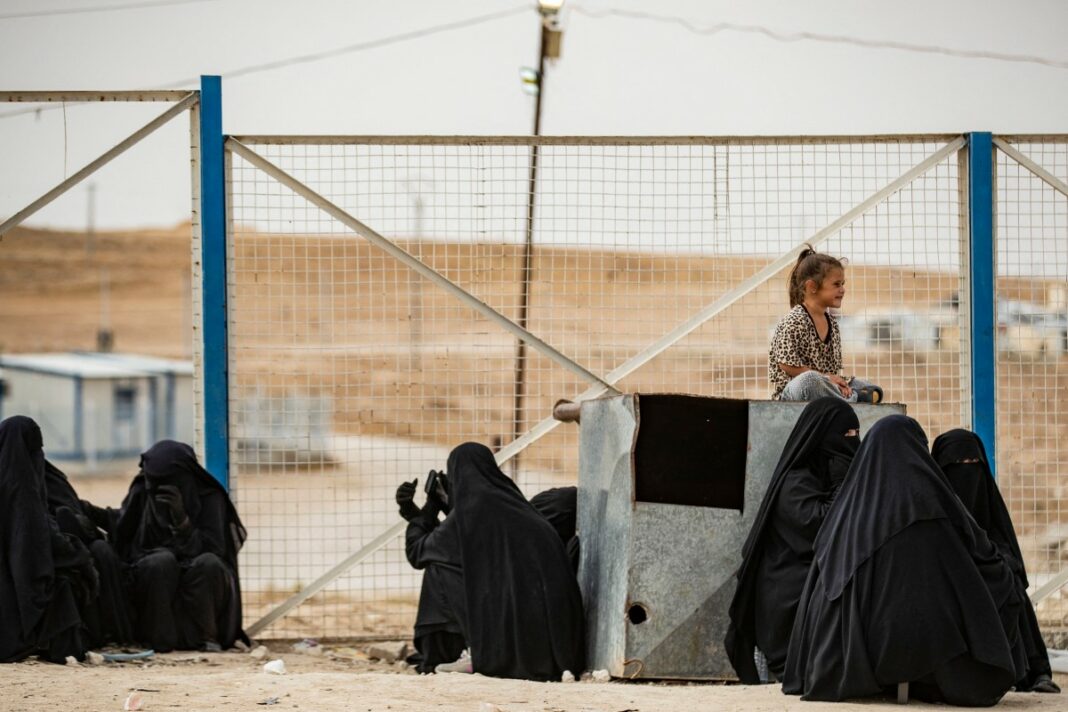Women affiliated with the Islamic State in Iraq and the Levent (ISIL) held in Syria’s al-Hol camp are being smuggled out after engaging in so-called “phone marriages” with jihadist men living abroad, primarily in Turkey and Europe, according to a special report by the Artı Gerçek news website.
A commander of the Hay’at Tahrir al-Sham (HTS) group, known by the alias “Ayyub Hawk,” spoke to an undercover journalist from Artı Gerçek posing as a potential customer for the smuggling operation and claimed that HTS, an Islamist group controlling parts of northwestern Syria, coordinates the escape of women from the camp and their subsequent illegal transfer across the Turkish border.
The al-Hol camp, located on the southern outskirts of the town of al-Hol in Syria’s northeastern al-Hasakah Governorate, was initially established in 1991 by the United Nations High Commissioner for Refugees to shelter Iraqi refugees during the Gulf War. It later reopened during the Iraq War and became a site for displaced Palestinians.
In recent years the camp has become a focal point in the Syrian civil war, housing over 60,000 people, including thousands of women and children with links to ISIL. The camp gained international attention in late 2018, when over 40,000 civilians, many with suspected ISIL ties, fled to al-Hol.
The camp has been plagued by poor living conditions, lack of medical services and violent incidents, particularly among ISIL-linked families who are housed in a separate, heavily guarded section. Security concerns persist, with ongoing violence attributed to ISIL cells operating within the camp, which some observers have called a “mini-state.”
According to Hawk, HTS charges between €25,000 and €45,000 to arrange the escape of a woman from al-Hol. He claimed the group guarantees their safe passage from the camp, located in a Kurdish-controlled region of northeastern Syria, to Turkey’s Hatay province, and eventually to Europe if needed.
‘Marriages’ facilitate smuggling
Many of the women in al-Hol, who come from countries across Europe, the Middle East and Central Asia, were captured following collapse of ISIL’s territorial control. While men linked to ISIL are held in nearby prisons, the women and their children who remain in the camp are often malnourished and living in poor conditions.
To escape, these women often engage in religious marriage with jihadist men after contacting them on social media. The marriages are conducted over the phone, with clerics reciting prayers to formalize the union remotely. According to the report, Hawk said that HTS facilitates the escape of women following these marriages, helping them cross into Turkey or other destinations.
Crossing the border into Turkey
Once a woman is “married” to a man outside the camp, HTS smugglers orchestrate the operation to free her from al-Hol. According to Hawk, the escape process begins when a group of HTS operatives sneaks into the camp and extracts the woman. The smuggling route often includes hiding the women in trucks or private vehicles that travel toward the Turkish border. Once in Turkey, the women are often hidden in safe houses until arrangements are made for their onward journey, which sometimes involves fake documents.
Hawk described how payments for these smuggling operations are often made in cryptocurrency, which the women manage using accounts set up via phone applications. He also said funds can be sent through other methods, such as hawala, a traditional informal money transfer system. One alternative method he suggested to the journalist was to deliver cash to a clothing store in Gaziantep, Turkey, which would then transfer the money to HTS.
The smuggling of ISIL-affiliated women from al-Hol into Turkey and Europe raises global security concerns. Western countries, including the US, UK and members of the European Union, have largely refused to repatriate women and children linked to ISIL, citing security risks. Many of these women remain stateless and stranded in legal limbo, posing a long-term challenge for international efforts to manage ISIL’s remnants.
HTS, which has fought against ISIL in Syria but shares its radical Islamist ideology, has taken advantage of the situation by running smuggling operations in coordination with jihadist men in Europe. Although Turkey has designated HTS as a terrorist organization, the group continues to maintain control over parts of Idlib, through which many women are smuggled into Turkey.
